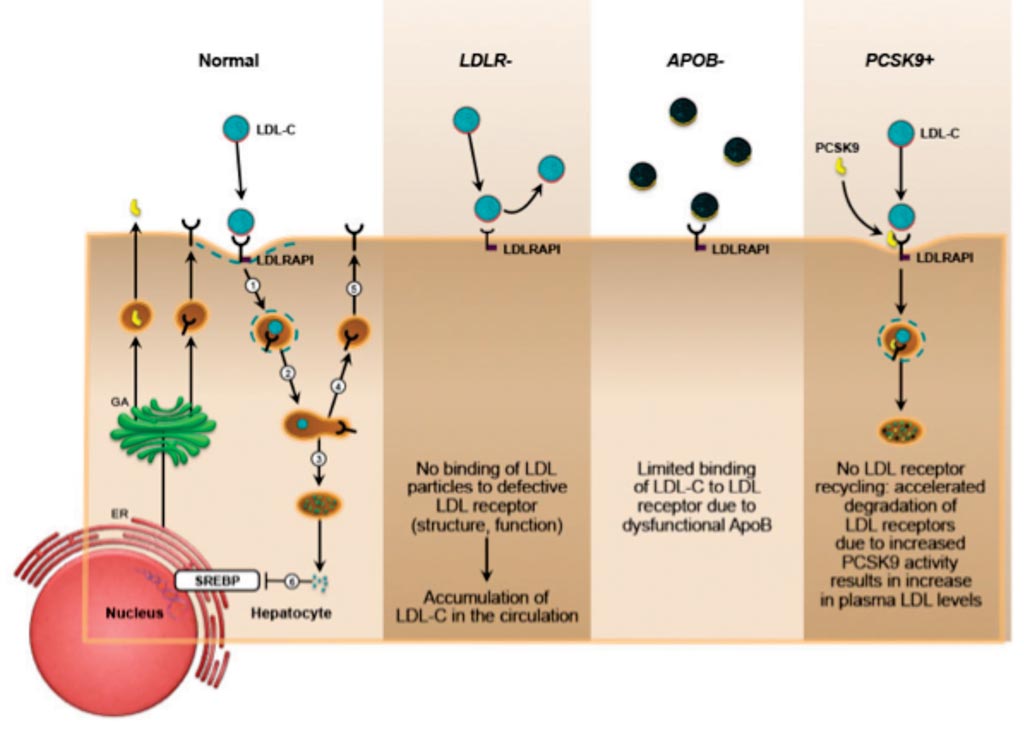Genetic Testing for Hypercholesterolemia Improves Diagnosis
By LabMedica International staff writers
Posted on 16 Aug 2018
Familial Hypercholesterolemia (FH) is caused by a genetic defect that hinders the body's ability to remove low-density lipoprotein (LDL) cholesterol from the blood. High LDL levels in the blood are more likely to result in narrowing of the arteries, which puts patients at substantially higher lifetime risk for heart disease and stroke at an early age.Posted on 16 Aug 2018
The condition occurs in around 1 out of 220 people and it is estimated that there are 30 million people with FH worldwide. However, FH is significantly underdiagnosed, largely due to the wide spectrum of phenotypes caused by a range of pathogenic variants. It is reported that more than 90% of patients worldwide and more than one million in the USA remain undiagnosed.

Image: Molecular basis of familial hypercholesterolemia with a dominant pattern of inheritance: impaired low-density lipoprotein cholesterol clearance due to variations in LDLR, APOB, PCSK9 (Photo courtesy of Mayo Clinic).
An expert panel led by the Geisinger Genomic Medicine Institute (Danville, PA, USA) has recommended that genetic testing should be the standard of care for patients who have a definite or probable diagnosis for FH based on clinical factors and family history. Wider use of genetic testing to identify FH patients is necessary, according to the expert panel, since cardiovascular conditions and other disease phenotypes might show up in a minority of patients, and there might be incomplete information on the prevalence of such conditions among relatives. Moreover, while patients with pathogenic FH variants generally have higher LDL-C levels, studies have shown a wide range of levels among patients.
The scientists recommended that those with very high LDL cholesterol and a positive family history of high cholesterol or early heart attack should be evaluated for pathogenic variants in at least three genes: low density lipoprotein receptor (LDLR), apolipoprotein B (APOB), and proprotein convertase subtilisin/kexin type 9 (PCSK9), though doctors may assess other genes based on a patient's specific phenotype. More than 2,000 unique genetic variants associated with FH have been identified to date, with around half being classified as pathogenic or likely pathogenic. More than 90% of pathogenic variants are in LDLR, between 5% and 10% are in APOB, and less than 1% are in PCSK9. Genetic testing doesn't always detect a pathogenic variant in one of these genes, and the authors noted that FH should be diagnosed clinically in the event of a negative test result.
Daniel J Rader, MD, a Professor of Molecular Medicine and a senior co-author of the study said, “In this era of precision medicine, genetic testing is an important tool to identify people at high risk for FH and guide the management of their LDL cholesterol to reduce long-term morbidity and mortality from early and aggressive CAD. Physicians should entertain the diagnosis of FH in their patients who have a family history of early heart disease and/or high LDL cholesterol, and consider offering a genetic test in those who may have FH.” The study was published in the August 2018 issue of the Journal of the American College of Cardiology.
Related Links:
Geisinger Genomic Medicine Institute














